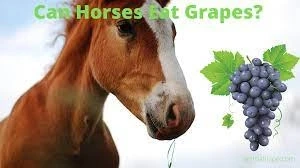Is It Safe to Feed Grapes to Horses? 🐴
Introduction
Welcome to the comprehensive guide on the safety of feeding grapes to our equine friends. The question "Is horse eat grapes?" is a common one among horse owners and enthusiasts. In this article, we will delve deep into this topic, exploring the potential risks and benefits, backed by expert insights and research.
The Dangers of Feeding Grapes to Horses
Feeding grapes to horses can pose serious health risks due to the presence of certain compounds that are toxic to equines. Grapes, along with raisins, contain substances that can lead to kidney failure in horses if ingested in significant quantities. As responsible caretakers of these magnificent animals, it\'s crucial to understand the potential dangers associated with feeding them grapes.
Understanding Grape Toxicity in Horses
Grape toxicity in horses is a serious concern that all horse owners should be aware of. The exact cause of grape toxicity remains unknown, but research suggests that certain compounds present in grapes can have adverse effects on equine health. These compounds can affect the kidneys, leading to renal failure and potentially fatal consequences.
Symptoms of Grape Toxicity in Horses
Recognizing the symptoms of grape toxicity is essential for prompt intervention and treatment. Horses that have ingested grapes may exhibit signs such as lethargy, decreased urination, abdominal pain, and dehydration. If you suspect that your horse has consumed grapes, it\'s imperative to seek veterinary assistance immediately.
Treatment and Management
In cases of grape ingestion, swift action is necessary to minimize the risk of kidney damage. Veterinary treatment may include supportive care such as intravenous fluids to maintain hydration and support kidney function. Additionally, your veterinarian may administer medications to address any gastrointestinal issues or other symptoms.
Prevention is Key
Prevention is the best approach when it comes to grape toxicity in horses. As responsible horse owners, it\'s crucial to ensure that grapes and raisins are kept out of reach of equines at all times. Educating yourself and others about the potential dangers of feeding grapes to horses can help prevent accidental ingestion and mitigate the risk of harm.
FAQs (Frequently Asked Questions)
- Are grapes toxic to all horses?
No, while grapes can be toxic to some horses, not all equines will have adverse reactions to them. However, it\'s best to err on the side of caution and avoid feeding grapes altogether.
- Can a small amount of grapes harm a horse?
Yes, even a small quantity of grapes can potentially harm a horse due to the toxic compounds they contain. It\'s best to refrain from feeding grapes to horses entirely.
- What should I do if my horse eats grapes?
If your horse has ingested grapes, contact your veterinarian immediately for guidance. Prompt medical attention is crucial to minimize the risk of complications.
- Are there any safe alternatives to grapes for horses?
Yes, there are plenty of safe and nutritious treats available for horses, such as carrots, apples, and commercial horse treats. These alternatives offer a tasty reward without the risk of toxicity.
- How can I ensure my horse stays healthy and safe?
To keep your horse healthy and safe, provide a balanced diet, regular exercise, and access to clean water at all times. Additionally, ensure that your horse\'s environment is free of potential hazards, including toxic foods like grapes.
- Is grape toxicity reversible in horses?
In some cases, with prompt veterinary intervention, the effects of grape toxicity may be reversible. However, the prognosis depends on various factors, including the amount of grapes ingested and the horse\'s overall health.
Conclusion
In conclusion, the question "Is horse eat grapes?" underscores the importance of understanding the potential risks associated with feeding grapes to horses. While grapes may seem like a harmless treat, they can pose significant health hazards to equines. As responsible horse owners, it\'s our duty to prioritize the safety and well-being of our beloved animals by avoiding grapes and opting for safer alternatives.


